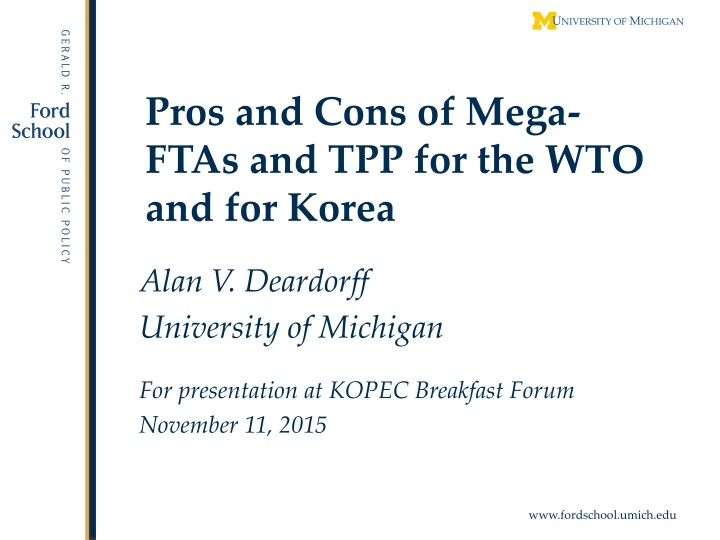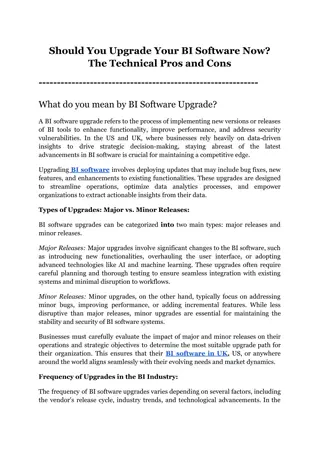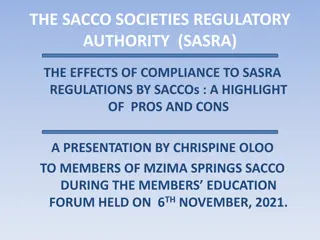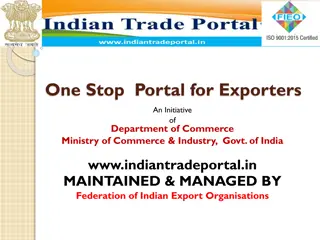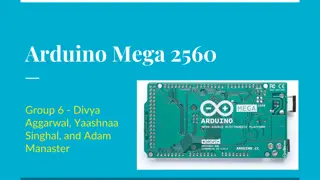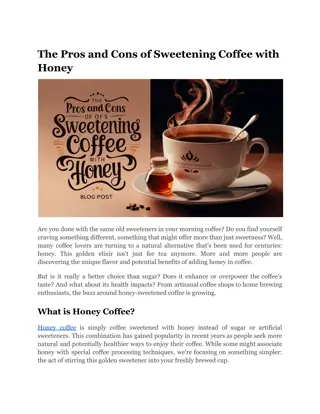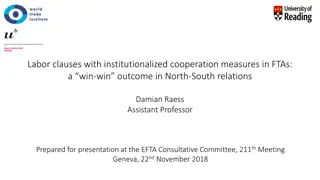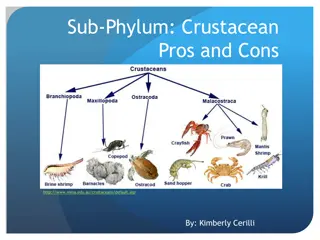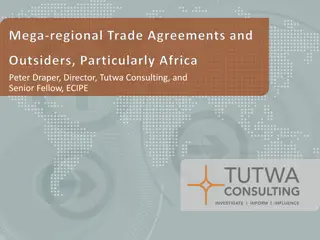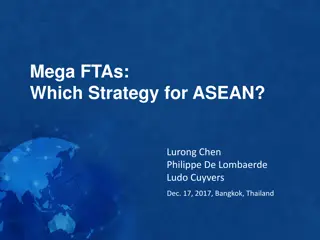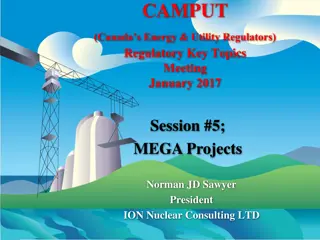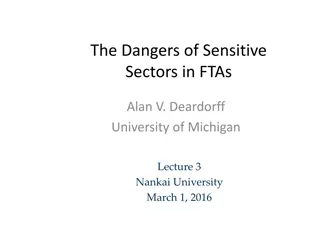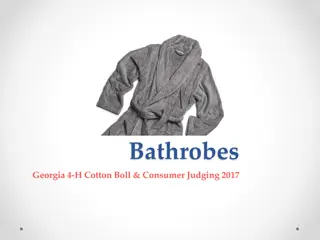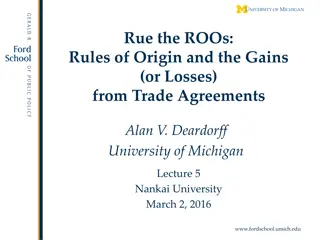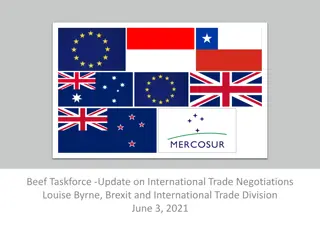Pros and Cons of Mega-FTAs and TPP
This content explores the advantages and disadvantages of Mega-FTAs and TPP for the WTO and Korea. It discusses aspects such as preferential tariff cuts, trade creation, trade diversion, rules of origin, and the implications of these agreements on various sectors. Additionally, it delves into contentious issues within the TPP negotiations and the potential impact on Korea.
Download Presentation

Please find below an Image/Link to download the presentation.
The content on the website is provided AS IS for your information and personal use only. It may not be sold, licensed, or shared on other websites without obtaining consent from the author.If you encounter any issues during the download, it is possible that the publisher has removed the file from their server.
You are allowed to download the files provided on this website for personal or commercial use, subject to the condition that they are used lawfully. All files are the property of their respective owners.
The content on the website is provided AS IS for your information and personal use only. It may not be sold, licensed, or shared on other websites without obtaining consent from the author.
E N D
Presentation Transcript
Pros and Cons of Mega- FTAs and TPP for the WTO and for Korea Alan V. Deardorff University of Michigan For presentation at KOPEC Breakfast Forum November 11, 2015 www.fordschool.umich.edu
Pros and Cons of FTAs Preferential tariff cuts Pro: trade creation Cons: Trade diversion Rules of origin (ROOs) Exemption of sensitive sectors 2 www.fordschool.umich.edu
Pros and Cons of FTAs Other aspects of actual FTAs Pros: Extension to trade in services Harmonization of regulations Cons (?): Extension of IP protection Trade enforcement of labor standards Trade enforcement of environmental standards Investor-State Dispute Settlement 3 www.fordschool.umich.edu
Additional Pros and Cons of Mega-FTAs Preferential tariff cuts Pros: Larger potential for trade creation If ROOs cumulative, less distorting Potential for adding members Cons: Though there are fewer outsiders, each may be harmed more by trade diversion 4 www.fordschool.umich.edu
Additional Pros and Cons of Mega-FTAs Other aspects of actual Mega-FTAs Pros: May contribute to broader and more uniform standards Cons: Their use as weapons of geopolitics 5 www.fordschool.umich.edu
Implications of Mega-FTAs for the WTO May create pressure to complete Doha Round. By hastening decline of weak industries, gradually reduce political forces for protection. Provide alternative fora for trade disputes. 6 www.fordschool.umich.edu
Implications of Mega-FTAs for the WTO WTO will continue to be important For plurilateral negotiations on issues that transcend the Mega-FTAs For dispute settlement For limiting slide into protectionism 7 www.fordschool.umich.edu
Contentious Issues in the TPP Several Issues threatened to derail the negotiations and were resolved only at the last minute: Auto Parts Biologic Drugs Dairy Products Japanese Agriculture: Rice, Pork and Beef ISDS Exchange Rates Most relevant for Korea 8 www.fordschool.umich.edu
Contentious Issues: Auto Parts Auto Parts Issues are Tariffs and other barriers into both US and Japan US has 25% tariff on trucks (& only 2.5% on cars) Japan has non-tariff barriers Rule of Origin for cars and car parts: Japan wanted it low, to permit it to include inputs from non-TPP countries such as Thailand and China. Mexico wanted it at least 50%, to preserve its advantage over those countries that is in the NAFTA, where it is effectively 53-55%. 9 www.fordschool.umich.edu
Contentious Issues: Auto Parts Resolution: Long phase-outs of US tariffs: trucks 30 years, cars 25, auto parts up to 15 45 percent TPP content for cars & light trucks to qualify for preference Who Won? Japan got what it wanted US got to keep tariffs for a long time Who Lost? Mexico 10 www.fordschool.umich.edu
Contentious Issues: Biologics Biologic Drugs (advanced medicines made from living organisms) The issue: Time period of permitted data secrecy US wanted 12 years of protection, as contained in the Affordable Care Act. Japan also favored long period of protection. Australia and others wanted much shorter protection, 5 or 6 years, so as to speed the development of generics and reduce costs. 11 www.fordschool.umich.edu
Contentious Issues: Biologics Resolution: The compromise set a mandatory minimum of five years, without setting a maximum, leaving both sides to declare victory. (NYT, Oct 6, 2015) US will keep it s 12-years of protection, but others will not. 5 years protection will be an increase for some countries. Who Won? Australia and others. Big Pharma in US will lobby against TPP. 12 www.fordschool.umich.edu
Contentious Issues: Dairy Dairy Products Exporters (New Zealand, U.S.) wanted reduced barriers into protected markets such as Canada and Japan New Zealand also wanted increased exports into U.S. Canada resisted because of its dairy support program. 13 www.fordschool.umich.edu
Contentious Issues: Dairy Resolution: Some expanded imports into Canada and US has been agreed Who Won? Not clear 14 www.fordschool.umich.edu
Contentious Issues: Japanese Ag. Rice, Pork, and Beef Japan has had a prohibitive tariff on imports of rice, protecting rice farmers who are important supporters of Japan s ruling Liberal Democratic Party. US and Australia are major exporters of rice and want access into Japan Pork and beef are similar to rice but less so: Japan has high tariffs, which the U.S. wants it to reduce. 15 www.fordschool.umich.edu
Contentious Issues: Japanese Ag. Resolution: Japan will lower its tariff on beef from over 30% to 9%. Japan will increase its quota on rice, but not lower its out-of-quota tariff. Don t yet know details for other products Who won and lost? Don t know yet 16 www.fordschool.umich.edu
Contentious Issues: ISDS ISDS: Investor-State Dispute Settlement This gives multinational firms leverage over governments to resist policies that reduce their profits Most objected-to have been actions by tobacco companies that use trade agreements to block cigarette labeling requirements 17 www.fordschool.umich.edu
Contentious Issues: ISDS Resolution: Cigarette companies will not have access to ISDS. Includes language affirming governments right to regulate in the public interest on the environment, health and other areas. Who Won? US companies (drugs, music, film) other than tobacco Who Lost? Tobacco Perhaps environmentalists and other advocates of government intervention 18 www.fordschool.umich.edu
Contentious Issues: Exchange Rates Exchange Rates Many in US wanted TPP to address currency undervaluation (which makes exports cheaper) Most other TPP countries opposed this, as did the Obama administration Countries often accused of currency manipulation include Japan and China. But so might US, when using monetary expansion. 19 www.fordschool.umich.edu
Contentious Issues: Exchange Rates Resolution: US Treasury announced that the TPP members would strengthen macroeconomic cooperation, including on exchange rate issues, in appropriate fora . Who Won? International economists and experts on macro/monetary policy Who Lost? Ford Motor Co. and other vocal advocates of response to exchange rate manipulation 20 www.fordschool.umich.edu
Contentious Issues and Their Resolutions In each case, there were losers and winners, usually in each country. Losers may now oppose the TPP. Thus support for TPP is reduced, and getting it past US Congress may be problematic. 21 www.fordschool.umich.edu
Implications of TPP for S. Korea If S. Korea does not join Will suffer trade diversion in countries without Korea FTA (Japan esp.) Will suffer trade diversion due to ROOs even in countries with Korea FTAs (US) Will not be subject to other requirements of TPP But most are already in KORUS 22 www.fordschool.umich.edu
Implications of TPP for S. Korea If S. Korea does join I can t see much harm, and considerable benefit. 23 www.fordschool.umich.edu
